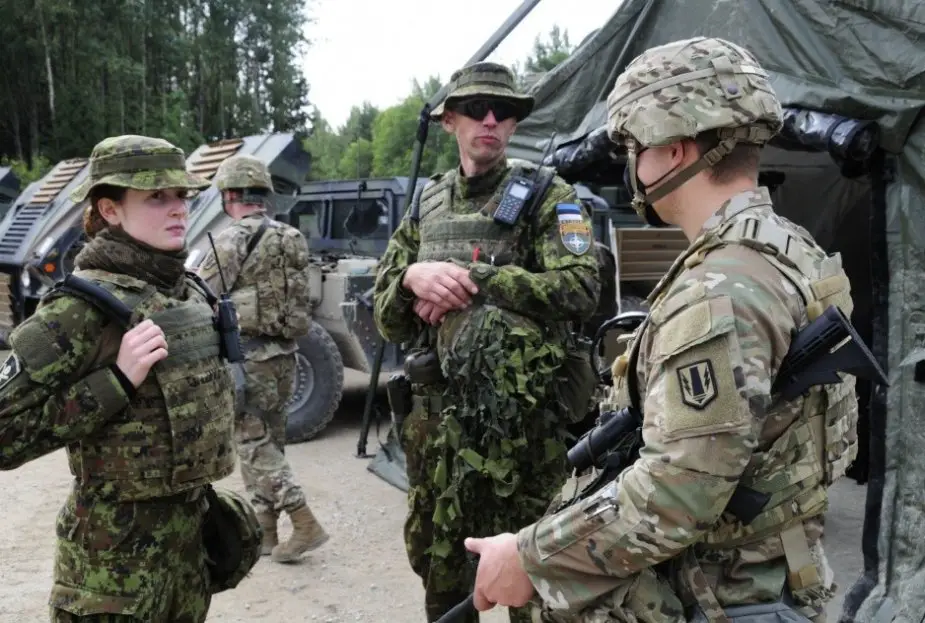Breaking news
U.S. and Estonia sign historic agreement for collaborative research in cyber defense.
The U.S. Army and the Republic of Estonia’s Ministry of Defence signed an agreement today that will enable the two countries to conduct future collaborative science and technology efforts in cyber defense. Edric Thompson, CCDC C5ISR Center Public Affairs, reports.
Follow Army Recognition on Google News at this link

1st Lt. Winters the fire direction officer for Bravo Battery, 1st Battalion, 6th Field Artillery Regiment talks with Estonian soldiers during Rail Gunner Rush live fire exercise in Tapa, Estonia Sept. 5, 2020 (Picture sorce: U.S. Army/Maj. Joe Bush)
The U.S. Command, Control, Communications, Computers, Cyber, Intelligence, Surveillance and Reconnaissance (C5ISR) Center – a component of Army Futures Command’s Combat Capabilities Development Command – and the Estonian Ministry of Defence will establish a multi-domain operations, cyber domain working group to identify opportunities for interoperability experimentation and demonstrations.
The working group will provide a forum to exchange information on the research of defensive cyber capabilities for multi-domain operations and improved coalition interoperability. Specific collaborative activities identified by the working group may be carried out under future agreements involving projects, equipment and material, and information exchanges. "This historic agreement provides the opportunity for two nations with substantial defensive cyber capabilities to leverage their respective cyber experience to drive new research and development to reduce cyber threats across the spectrum of conflict,” said Director of the C5ISR Center Patrick J. O’Neill.
The effort – which falls under a 2016 U.S. Department of Defense Research, Development, Test and Evaluation memorandum of understanding – is the first of its kind between the U.S. Army and the Estonian Ministry of Defence. It supports a “Vision for Security Cooperation” document between the countries to develop capabilities that will deter and defend against malicious cyber intrusions and attacks.
“The Estonian Ministry of Defence is very pleased to establish formal cooperation with the U.S. Army’s C5ISR Center, adding another partner with increased knowledge and capabilities. Our countries are close NATO allies who share fundamental values. Our collaboration in the cyber domain will advance our common security,” said Director of the Estonian Ministry of Defence’s Cyber Policy Department Andri Rebane. “We hope that the knowledge generated from this bilateral relationship will not only be useful for the U.S. and Estonia but also our other allies. With that, I am pleased to sign the terms of reference to begin this important work,” said Rebane.
Prior to the event, Deputy Assistant Secretary of the Army for Defense Exports and Cooperation Elizabeth Wilson noted her office played an integral role in bringing together key personnel from U.S. Army headquarters, the C5ISR Center and counterparts at the Estonian Embassy to reach this milestone event. “Exchanging information and optimizing our research and development efforts to modernize our militaries will help deter great power competitors and regional state adversaries. The U.S. Army is proud to partner with our Estonian counterparts in this unique opportunity," said Wilson.
The complementary research will explore tactical and strategic challenges to enable standardization, rationalization and interoperability while improving the mutual defenses of both countries, said Robert Kimball, the C5ISR Center’s senior research scientist for cyber security. “Estonia is a cyber country of excellence with a robust cyber defensive system in terms of technology and people. Given their deep expertise, I believe they will have substantial lessons to share, which will be enormously helpful in finding efficiencies in our science and technology efforts while understanding how best to defend against cyber warfare,” said Kimball, who noted Estonia is home to the NATO Cyber Defense Center and Cyber Range.
The agreement is slated to last until Sept. 30, 2023, at which point it may be extended.



















